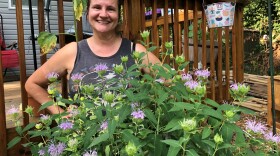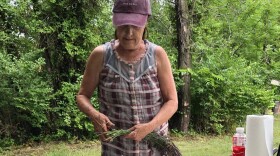-
Through Kansas City’s land bank program, Jameson Hubbard bought 16 small lots along Highland Avenue and turned them into farmland. He sells produce at the Overland Park Farmers' Market and through a CSA program.
-
Despite its long history of valuable service to the community, recent challenges within the Ivanhoe Neighborhood Council have cast doubt on the future of the organization and the residents of the neighborhood. Now, past and present generations of leadership are working to rebuild faith, and instill hope in residents of this east side community.
-
Between spring and fall (and sometimes year-round), farmers markets around Kansas City offer fresh produce, flowers, artisan-made goods and treats. Find out how to shop local in towns and neighborhoods across the metro.
-
Farms and non-profits around Kansas City have recently lost, or could lose, grant funding from the USDA under the Trump Administration. Despite facing financial uncertainty, urban growers plan to continue fighting food insecurity.
-
Ivanhoe farmers market was 'part of the solution' for food insecurity. Then Trump canceled its grantThe Ivanhoe Neighborhood Council in Kansas City recently learned its three-year, $165,000 grant from the USDA to expand its farmers market had been revoked because of President Donald Trump’s executive order targeting diversity and environmental justice programs.
-
Many of the residents of the Ivanhoe neighborhood say getting to and from the grocery store creates one of the biggest barriers to accessing fresh food. A new program involving a passport and stamps will connect people to locally grown, healthy options.
-
With about 85 members, including individuals with just a single plant as well as those with acres of land, Kansas City Black Urban Growers, or KCBUGS, works to address obstacles faced by Black farmers and improve community health.
-
Ottawa city officials are trying to strike a balance between people who want to produce food and the interests of their neighbors
-
The Steinegers are part of a wave of nontraditional farmers in Kansas and Missouri who taking chances on niche crops — motivated by spirituality, tourism and simply giving back to their communities.
-
For the second consecutive year, Missouri has set aside $500,000 to address food insecurity in urban areas. But for farmers like Darian and Nicolette Davis, who run an orchard in Kansas City’s Swope Park, even applying for a grant opportunity is a challenge.
-
City councilmembers now will consider whether to make the chicken rules permanent and whether to reduce or drop the minimum land requirement. Overland Park's animal control department noted there have been no documented complaints on properties with chicken permits since the pilot began in March 2022.
-
As summer creeps in, so do heaps of fresh produce at local farmers markets. KCUR's food writers are back with ideas for where to find fresh, at-home ingredients, and where to grab a meal made with locally-sourced produce.
Play Live Radio
Next Up:
0:00
0:00
Available On Air Stations











